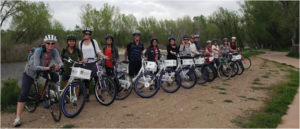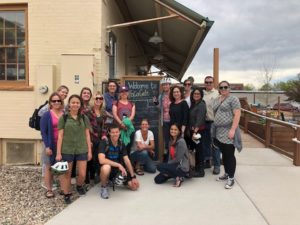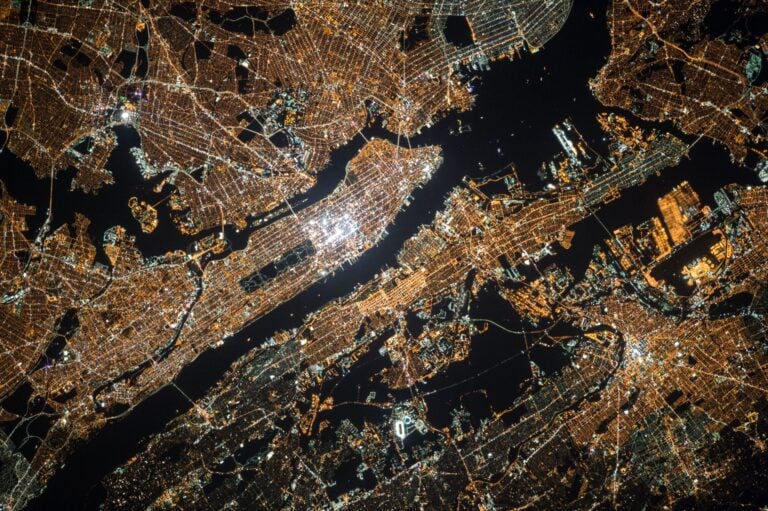Social Responsibility: Awareness of Ourselves, Our Communities and Our Environment
 In this day and age, it’s more important than ever to understand the responsibility that we have toward our community and to ourselves. With social media constantly dividing us, it can be difficult to be mindful of the challenges that others face. That is why the Sustainability Leadership Program made the focus of today’s workshop about social responsibility, for others and ourselves. I came back from today with an understanding of social equity, a meditated mind, and a 6-mile bike ride.
In this day and age, it’s more important than ever to understand the responsibility that we have toward our community and to ourselves. With social media constantly dividing us, it can be difficult to be mindful of the challenges that others face. That is why the Sustainability Leadership Program made the focus of today’s workshop about social responsibility, for others and ourselves. I came back from today with an understanding of social equity, a meditated mind, and a 6-mile bike ride.
We started off the morning by meeting at Odell’s Brewing at 9 am to be greeted by Janet Freeman, the Equity and Inclusion Coordinator for the City of Fort Collins. She spoke to us about racism and how it has been a part of our society, and government, since Europeans first stepped foot on American soil and is still prevalent today. Ultimately, racism, or any discrimination for that matter, is broken down into 3 levels: personal, institutional, and structural. Personal racism is how an individual feels toward people based on the color of other people’s skin. Institutional racism is how racism is practiced within social institutions, usually by providing benefits or resources to white people while withholding those same benefits from people of color. Finally, structural racism is how all of these institutions work together to perpetuate this dynamic, which can even feed back into individual racism as it can shape how people are raised and educated. Unfortunately, it is not easy to change institutional and structural racism, especially since equity has been politicized. But if we are able to eliminate ignorance and educate the population to make them aware of racial injustice, a shift can be made. Additionally, if local governments and businesses start to look at their projects through an equity lens, the institutions can start to break down their racism.
After a quick coffee break, we were led through 2 short meditations with Margit Hentschel from the CSU Center for Mindfulness. She first spoke of the work she’s done with small children as well as many members of the Wounded Warrior Project who have all seemed to benefit from learning to meditate and be mindful. She then asked us to find a comfortable position, be it sitting or laying down, to begin a short, guided meditation. We closed our eyes and focused only on our breathing, being aware of the sensations we felt as we did, like the breath that passed over our lips or out our nose, the pace at which we took our breaths, and if our mind wandered from this focus. This acute focus can help us shift our mind from being reactive to instead take time to be thoughtful and respond. The second meditation was focused on empathy and loving. We again closed our eyes and grounded ourselves in a comfortable position and were asked to focus on the feeling of love we have for a family member, friend, or pet. We were to become aware of how we felt not only in our head, but in our heart and our whole body. The rest of the meditation was taking that feeling of pure love and shifting it to someone you kind of like, someone you’re neutral toward, someone you dislike, and finally yourself. This was to understand that everyone deserves love and has someone who loves them.
 Toward the end of meditation, the growls of some people’s stomachs could be heard, so we quickly went to the bike station after everyone was situated with a helmet. We rode along the Spring Creek trail from Odell’s to FoCo Café, a pay-as-you-can lunch place, where we all ate a soup and salad for lunch. We were asked to donate to the Giving Tree, a closet with supplies for those in need, like clothes, dog food, deodorant, and even novelty things like piggy banks, to put a smile on a kid’s face. Additionally, there is a free-food fridge and pantry, which are filled by both community members and local companies like Panera Bread or Trader Joes. Though, the fridge is also stocked by fresh vegetables grown on the property of FoCo Café, though a majority of those veggies are used in their own soups and salads. Before we got on our bikes and left, we looked at the water station, which is available year-round for anyone and everyone. This is especially useful in the winters when the water fountains in city parks are shut down and reliable water is hard to come by. I highly recommend FoCo Café as a place to both eat and volunteer to become closer to the community.
Toward the end of meditation, the growls of some people’s stomachs could be heard, so we quickly went to the bike station after everyone was situated with a helmet. We rode along the Spring Creek trail from Odell’s to FoCo Café, a pay-as-you-can lunch place, where we all ate a soup and salad for lunch. We were asked to donate to the Giving Tree, a closet with supplies for those in need, like clothes, dog food, deodorant, and even novelty things like piggy banks, to put a smile on a kid’s face. Additionally, there is a free-food fridge and pantry, which are filled by both community members and local companies like Panera Bread or Trader Joes. Though, the fridge is also stocked by fresh vegetables grown on the property of FoCo Café, though a majority of those veggies are used in their own soups and salads. Before we got on our bikes and left, we looked at the water station, which is available year-round for anyone and everyone. This is especially useful in the winters when the water fountains in city parks are shut down and reliable water is hard to come by. I highly recommend FoCo Café as a place to both eat and volunteer to become closer to the community.
Biking to the Growing Project was my last stop since I had to take one last final at CSU during the same time as the final session of the day. At the Growing Project, we met Dana Guber who told us about what they do and why they do it, followed by a tour of the farm. While growing food seems like their main objective, they actually are focused on providing social justice through the act of growing food. They see it as an opportunity to heal individual people while connecting communities. They face struggles, like barely making enough money to pay their workers while also needing to move about every 2 years due to land costs. They have recently reshaped their program from giving food out to those in need to inviting those people to work on the farm, which will give them experience and connections as well as food. They practice intensive agriculture so they can make the most money from the land they have, but they do so in a way that is not too harmful to the soil. They have their own on-site compost which is fed by food scraps, yard waste, and aged horse manure. Since rainwater collection was legalized in Colorado back in 2015, they have been sure to attach rain barrels to all of the gutters to help them lower their costs of irrigation. When asked about what we should do for our own gardens, she recommended that we try to grow plants that are not very water-intensive, suggesting native plants instead of tropical ones. The farm was small but densely packed and was being tended to by someone truly passionate about what she was doing. I am really glad we visited and will definitely look into volunteering my time to help and give back to the community.
The SLA strives to provide members of the program with the experience needed to spark growth for our social awareness. We believe that with the proper tools, anybody can contribute to create a more equitable society. Personally, I’ve very glad to have had this experience and have found it to be quite insightful. I will definitely be practicing mindfulness in my day-to-day life and will stop by the FoCo Café again soon to eat, chat, donate, and volunteer!
By Emily Niederbremer

